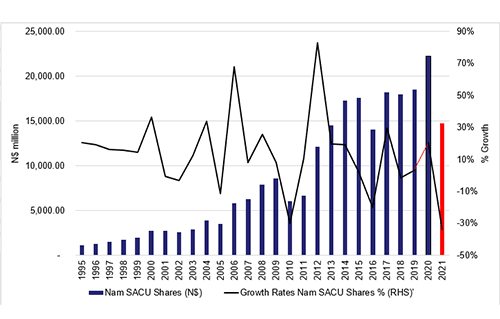For the financial year 2021/22, Namibia’s share of the Southern African Customs Union (SACU) receipts will decline by about 34% to N$14.8 billion, down from N$22.3 billion in 2020/21.
The SACU decline was underpinned by the collapse in imports into SACU and mainly imports into South Africa, which fell to 2012 levels, and import duty collections were estimated to be as bad as in the worst year after the global financial crisis.
According to the Bank of Namibia (BoN) governor Johannes !Gawaxab in the bank’s annual report for last year, Namibia’s current account recorded a surplus during 2020, contributing to an increase in foreign exchange reserves.
The current account recorded a surplus balance of N$3.4 billion during 2020, translating into a surplus of 1.9% of gross domestic product (GDP).
“This was partly due to the narrowing of the merchandise trade deficit on the back of lower imports as the Covid-19 pandemic resulted in reduced domestic demand. Although the value of merchandise exports also declined, as earnings from rough diamonds, food, and live animals, and manufactured products fell, the decline in imports was bigger, hence the improvement in the trade deficit,” he said.
Moreover, an improvement in the secondary income account resulting from higher SACU receipts further contributed to the current account surplus in 2020. These factors were complemented by inflows arising from an African Development Bank (AfDB) loan, raising Namibia’s stock of international reserves.
In terms of competitiveness, the real effective exchange rate (REER) depreciated on a year-on-year basis, signalling enhanced competitiveness of Namibian products in foreign markets and helping to underpin the smaller trade deficit.
Overall, interest rates were reduced and remained low throughout 2020, impacting short-term and bond portfolio earnings. As a result, !Gawaxab added, interest earnings generated on the ZAR and other currency investment exposures decreased year-on-year.
In addition, the net loss on foreign investments realised on foreign exchange forward contracts, combined with an increase in total operating expenses, further contributed to the drop in the surplus.


